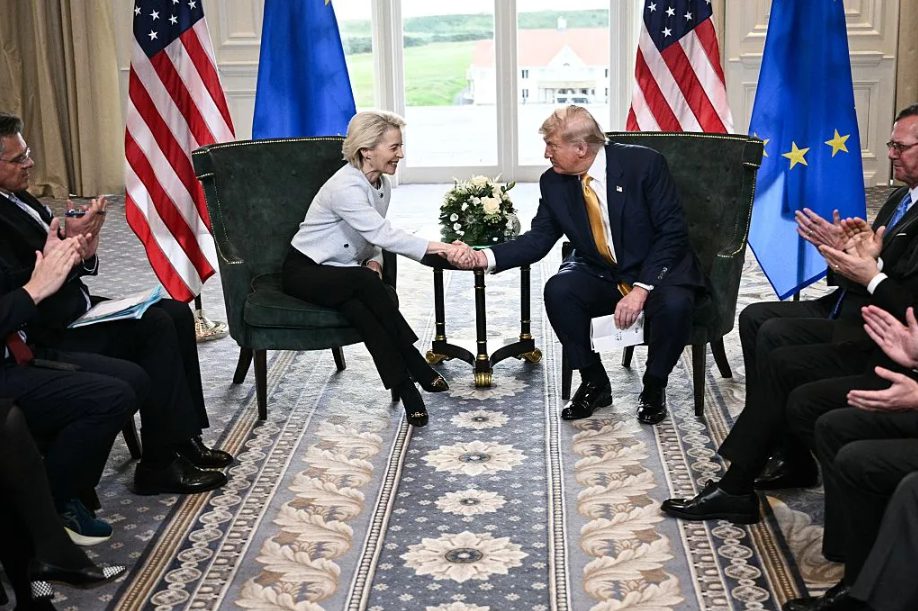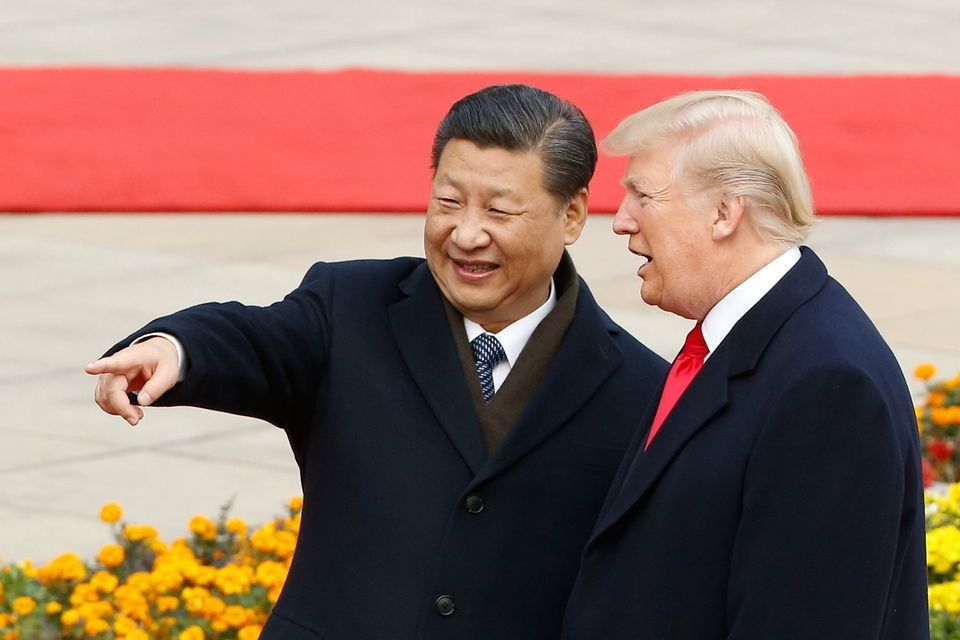The White House has not publicly confirmed the planned truce extension, and the US administration was not immediately available for comment.
US and China expected to extend tariff truce by 90 days
Jul, 28, 2025
3 min read
by Nellius Irene
for CryptoPolitan

Beijing and Washington plan to tack another 90 days onto their trade war truce as the two countries prepare to begin another round of negotiations in Stockholm on Monday, the South China Morning Post (SCMP) reports, citing sources familiar with the matter.
This third round of high-stakes negotiations represents the latest attempt by the two countries to stabilize one of the world’s most important economic relationships. It builds on previous talks in Geneva and London, which were aimed at checking the rapid advance of tariffs and laying a foundation for a broader de-escalation of trade tensions.
According to the SCMP article, the US and China will commit not to levy new tariffs or take aggressive actions during the 90-day proposed extension. The announcement indicates that both sides want to keep talking and avoid a fresh flare-up in the tensions roiling global markets for years.
Beijing demands tariff review on fentanyl chemicals
A key new hiccup to these talks is that they extend far beyond traditional trade issues: They also involve threats to restrict exports of fentanyl, a potent and deadly synthetic opioid.
The Chinese delegation will also demand during the discussions with US officials that the Trump administration remove tariffs on components of a chemical used to make fentanyl, according to people familiar with the matter.
The synthetic opioid has been a leading driver of overdose deaths in the United States. America has blamed Chinese suppliers for adding to the crisis by shipping out precursor chemicals. In retaliation, tariffs were placed on certain chemical imports that were suspected to be in the fentanyl supply chain.
Beijing, though, says that these tariffs set back the cooperative fight to reduce illegal drug flows. Chinese officials are also likely to argue for a more collegial approach, including technical collaboration and intelligence sharing, rather than punitive tariffs.
Although the fentanyl crisis has been a significant focus for the US regarding domestic policy, it is uncertain whether the Biden trade team would agree to modify the tariff approach in the space at a time of domestic election, including amid widespread frustration with Chinese policies.
US and China pause new tariffs for 90 days
If the 90-day cease-fire that was reported comes to pass in Stockholm, it would mark a deliberate halt in one of the longest trade wars of modern times.
The US and China have levied tariffs on more than $700 billion worth of each other’s goods since 2018. The trade war disrupted supply chains worldwide, affected the agriculture and technology industries, and changed how global multinationals arrange their operations.
An interim pause, analysts say, would give businesses that have been ensnared in the crossfire for years a chance to breathe. It would also allow both sides to work on thornier long-term issues like intellectual property protection, digital trade, and forced technology transfers.
The 90-day period is not a permanent solution but a window of opportunity. Its success will depend largely on the political will of both the United States and China to move the negotiations forward or risk renewed tensions.
The timing of the Stockholm meetings is also crucial. The United States is heading into a ferocious election cycle, and neither side may want to appear as if it is soft on trade, for China, where a slowing economy and increasing pressure from domestic industries are probably fueling a more practical approach to diplomacy.
Although there is optimism about the meeting, experts warn that many core structural issues have yet to be resolved. The truce over tariffs might help defuse tensions, but it is anything but a permanent solution.
What unfolds this week in Stockholm could decide whether the world’s two biggest economies are on a path to rekindled cooperation — or merely deferring the next round of confrontation.
Cryptopolitan Academy: Tired of market swings? Learn how DeFi can help you build steady passive income. Register Now
Read More

EU Bends Knee: Trump’s $1.35T Trade Deal Sends Stocks Soaring
A Trump EU trade deal worth $1.35 trillion has actually triggered a massive global st...
Jul, 28, 2025
2 min read
by Watcher.Guru
US and China expected to extend tariff truce by 90 days
Jul, 28, 2025
3 min read
by Nellius Irene
for CryptoPolitan

Beijing and Washington plan to tack another 90 days onto their trade war truce as the two countries prepare to begin another round of negotiations in Stockholm on Monday, the South China Morning Post (SCMP) reports, citing sources familiar with the matter.
This third round of high-stakes negotiations represents the latest attempt by the two countries to stabilize one of the world’s most important economic relationships. It builds on previous talks in Geneva and London, which were aimed at checking the rapid advance of tariffs and laying a foundation for a broader de-escalation of trade tensions.
According to the SCMP article, the US and China will commit not to levy new tariffs or take aggressive actions during the 90-day proposed extension. The announcement indicates that both sides want to keep talking and avoid a fresh flare-up in the tensions roiling global markets for years.
Beijing demands tariff review on fentanyl chemicals
A key new hiccup to these talks is that they extend far beyond traditional trade issues: They also involve threats to restrict exports of fentanyl, a potent and deadly synthetic opioid.
The Chinese delegation will also demand during the discussions with US officials that the Trump administration remove tariffs on components of a chemical used to make fentanyl, according to people familiar with the matter.
The synthetic opioid has been a leading driver of overdose deaths in the United States. America has blamed Chinese suppliers for adding to the crisis by shipping out precursor chemicals. In retaliation, tariffs were placed on certain chemical imports that were suspected to be in the fentanyl supply chain.
Beijing, though, says that these tariffs set back the cooperative fight to reduce illegal drug flows. Chinese officials are also likely to argue for a more collegial approach, including technical collaboration and intelligence sharing, rather than punitive tariffs.
Although the fentanyl crisis has been a significant focus for the US regarding domestic policy, it is uncertain whether the Biden trade team would agree to modify the tariff approach in the space at a time of domestic election, including amid widespread frustration with Chinese policies.
US and China pause new tariffs for 90 days
If the 90-day cease-fire that was reported comes to pass in Stockholm, it would mark a deliberate halt in one of the longest trade wars of modern times.
The US and China have levied tariffs on more than $700 billion worth of each other’s goods since 2018. The trade war disrupted supply chains worldwide, affected the agriculture and technology industries, and changed how global multinationals arrange their operations.
An interim pause, analysts say, would give businesses that have been ensnared in the crossfire for years a chance to breathe. It would also allow both sides to work on thornier long-term issues like intellectual property protection, digital trade, and forced technology transfers.
The 90-day period is not a permanent solution but a window of opportunity. Its success will depend largely on the political will of both the United States and China to move the negotiations forward or risk renewed tensions.
The timing of the Stockholm meetings is also crucial. The United States is heading into a ferocious election cycle, and neither side may want to appear as if it is soft on trade, for China, where a slowing economy and increasing pressure from domestic industries are probably fueling a more practical approach to diplomacy.
Although there is optimism about the meeting, experts warn that many core structural issues have yet to be resolved. The truce over tariffs might help defuse tensions, but it is anything but a permanent solution.
What unfolds this week in Stockholm could decide whether the world’s two biggest economies are on a path to rekindled cooperation — or merely deferring the next round of confrontation.
Cryptopolitan Academy: Tired of market swings? Learn how DeFi can help you build steady passive income. Register Now
Read More

EU Bends Knee: Trump’s $1.35T Trade Deal Sends Stocks Soaring
A Trump EU trade deal worth $1.35 trillion has actually triggered a massive global st...
Jul, 28, 2025
2 min read
by Watcher.Guru
